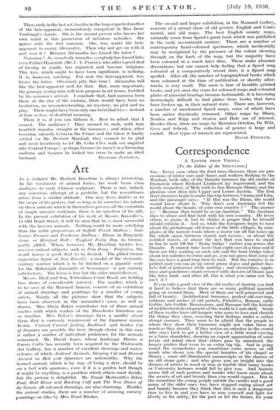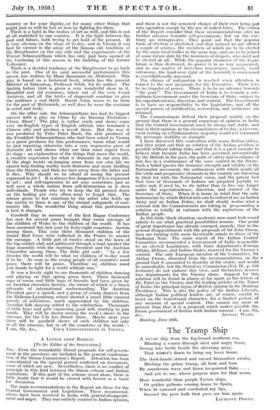Correspondence
A LETTER FROM VIENNA. [To the Editor of the SPECTATOR.] Sia,—Every year, when the fruit trees blossom, there are pro- cessions of motor cars and 'buses and walkers flocking to the Wachau, both sides of the Danube between the old castles of Diirnstein where Richard Lionheart lay imprisoned, and the lovely monastery of Melk with its fine Baroque library and the glorious view deep into Upper and Lower Austria. The first river steamers begin to make the trip between Vienna and Linz, and the passenger says : " If this was the Rhine, the world would know about it. Why don't you Austrians tell the world about the beauty of your own country ? " The answer is : " Because that would be so un-Austrian." The Austrian likes to abuse and find fault with his own country. He loves others to praise it, but lie thinks it proper that he himself should criticize it. And so, while the foreigners begin to rave about the picturesque old houses of the little villages, he com- plains of the narrow roads where a motor car all but takes up the whole space between church and tavern ; or about the cobbled streets, or about the fact that you have to stand in line to wait till the " flying bridge " carries you across the Danube. It cannot take more than eight cars at a time and if there are fifty waiting on each side and the boat bridge takes about ten minutes to come and go, you can guess that some of the ears have a good long time to wait. But the country is so perfect and you can go up sweet green slopes and gather bass kets full of primroses while waiting ; and cherrytrees, apple- trees and peachtrees stand covered with showers of bloom just like fairy land—and after all, this is what you came out for, isn't it If you take a good view of the old castles of Austria you find it hard to believe that there arc so many political quarrels going on around them. Most of them are well preserved and full of beauty. Architectural treasures, perfect old carvings, columns and arches of old periods, Primitive, Roman, early Gothic, late Gothic, Renaissance, and Baroque tell the history of architectural development of the world in a nut-shell. Some of these castles have old keepers who seem to love and cherish the things they show, covering their feelings under a rather abrupt manner. They seem to be afraid that the people to whom they show their treasures might not value them as much as they should. If they notice an onlooker in the crowd who stays back to get is better view of a little wood carving or a brass chandelier, showing an expert appreciation of some lovely old inlaid chest that others pass by unnoticed, the keeper prefers that even to an extra big tip. And in going round the monasteries you sometimes come across an old monk who shows you the special beauties of his chapel or library ; sonic old illuminated manuscripts or the charms of an old stone gate ; and who gives you an insight into the dreams of artists in wood or iron or marble that many books Or UniVersity lectures would fail to give you. And Austria seems full of such porters and monks who know more about the secrets of art and beauty than you would- expect.. But in the meantime the young people outside the castles and a good many of the older ones, too, have stopped caring about art and beauty because they think that this is such a dangerous time to live in and you have to arm yourself and fight for liberty or for safety,. foe the past or for the future, for your
country or for your dignity, or for many other things that might just as well be lost as won by fighting for them. There is a fight in the realms of art as well, and this is not at all restricted to one country. It is the fight between the past and future, both trying to get hold of the present. It is very obvious on the stage of to-day, and in Vienna it can best be viewed in the array of the famous old tradition of the Burgtheater on the one side and the experiments of the Wiener Schauspielhaus which has only just been opened at the beginning of this season in the building of the former Volksoper.
There is a decided tendency at the Burgtheater to go back to the past. One of its most successful performances this season was written by Hans Sassmann on Metternich. This play is based on a historical book, which has the present Minister of Education, Professor Srbik, for its author. The Austria before 1848 is given a very wonderful show in it. Beautiful real old costumes, taken out of the very Court Archives, and all the tricks of stagecraft combine to give the audience a real thrill. Raoul Asian seems to be born for the part of Metternich, so well does he wear the costume in mind and body.
On the other side, the Schauspielhaus has had its biggest success with a play on China by she Russian Tretiakow : China, Shout! The play is rather crude and shows some very un-English types of English officials who bombard a Chinese city and produce a revolt there. But the way it was produced by Fritz Peter Ruch, the able producer of the Frankfurt Schauspielhaus who had been asked to Vienna as a guest producer for this performance, turns what would be just reporting otherwise into a very impressive piece of dramatic art and shows what our time must expect from its stage : an explanation of the things that move the world, a creative expression for what is dramatic in our own life. If the stage insists on keeping away from our own life we cannot help finding reality more dramatic and more thrilling than the theatre, and then we turn away from the latter and it dies. 'Why should we be afraid of seeing the present expressed in art ? It is always less dangerous if it is expressed in art ; and self-expression in art may sometimes just as well save a whole nation from self-destruction as it does individuals. People who try to keep the lid pressed down on the boiling pot very often seem to forget that. The release given to hot emotions by the artist who holds up the mirror to them is one of the eternal safeguards of com- munity life. The wonderful thing about this performance is how it changes.
Goodwill Day in memory of the first Hague Conference has now for several years brought that sweet message of the children of Wales to the children of the world. It has been answered this last year by forty-eight countries, Austria among them. This year three thousand children of the Junior Red Cross were collected in the Prater to answer the message. A little girl of twelve stood on the lawn of the big cricket club and addressed through a loud speaker the huge assembly with the Austrian President and the Austrian Chancellor among them. The little girl said : " In a few decades the world will be what we children of to-day want it to be. As soon as the young people of all countries want peace, there will be peace. Therefore we children must join hands to fight for a world without war."
It was a lovely sight to see thousands of children dancing and playing on that spring green lawn. Three thousand cups of cocoa and little bags of biscuits had been given by an Austrian chocolate factory, the owner of which is a brave advocate of international understanding. The Austrian President gave a speech, and a group of young dancers from the Dellerau-Laxenburg school showed a sweet little musical parody of militarism, much appreciated by the children. Austrian folk dancing added to the celebration. Thousands of little boys and girls expressing good will, wanting to join hands. They will be shown among the week's shows in the cinemas, for the Ufa has filmed them. Maybe next year there will be goodwill shows of such children not only M all the cinemas, but in all the countries of the world.- ' am, Sir, &c., YOUR CORRESPONDENT IN VIENNA.

















































 Previous page
Previous page